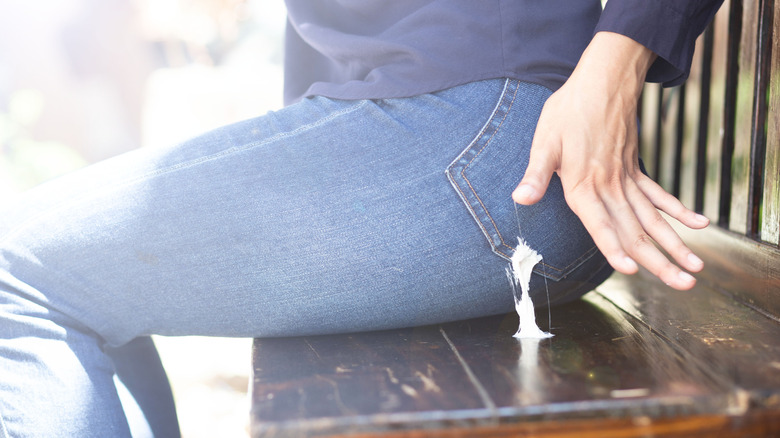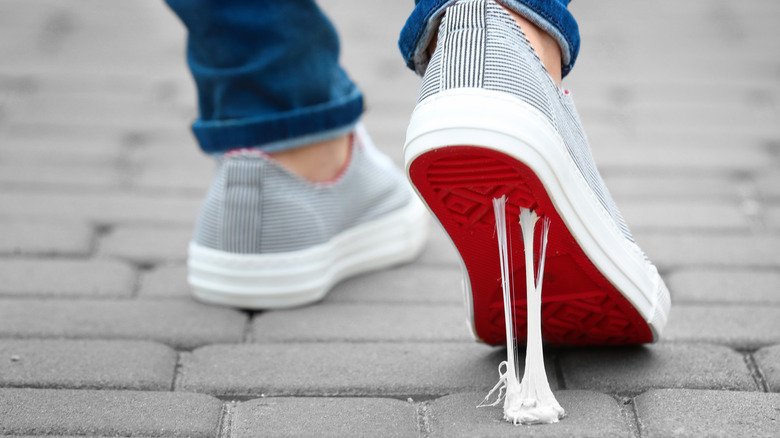Chewing Gum In This Country Could Get You A Hefty Fine
Chewing gum may seem innocuous, but it has long been controversial. Schools, loath to have the slowly-hardening remains stuck to desks, walls, floors, and anywhere else students can reach, take a very dim view of it. In addition, of course, the old legend states that if you inadvertently swallow some, it will remain in your body for years.
As Healthline reports, it isn't true that swallowed gum will sit in the deep recesses of our digestive systems for seven years. Within days, it will usually depart our bodies in the usual fashion (there's no need to dwell on that), but it can still pose a digestive danger if a lot of it is swallowed often enough. Further, too much chewing of gum can reportedly lead to issues such as ulcers in the mouth.
Gum, then, is for chewing only, in moderation, and disposing of responsibly after doing so. If you're in Singapore, however, you'll need to avoid it entirely, because the penalties for gum chewing are rather severe.
There'll be no gum on Singapore's sidewalks
The Civil Aviation Authority Singapore clearly states that there are several items banned from being taken into Singapore. Among them are some of the usual suspects, such as "endangered species of wildlife and their byproducts" and "seditious and treasonable materials." Also on the list, however, is chewing gum.
Only nicotine gum and medical gum for specific dental needs is permitted to be taken into the city-state, per the Civil Aviation Authority. Why, though, is Singapore so gum-averse?
In March of 2015, BBC News reported the sad death of Lee Kuan Yew. It was Yew who oversaw Singapore's great prosperity during his tenure as prime minister, an office he assumed in 1959 and held until 1990, per Britannica. As Singapore's first prime minister, he had the unenviable task of building up a small and isolated nation newly split from Malaysia (in 1965). One of his big priorities in doing so, it seems, was establishing impeccable standards of cleanliness, hygiene and tidiness. As many teachers will tell you, chewing gum often flies in the face of these particular aims, and so Singapore set about becoming almost entirely gum free.
Taking littering laws super seriously
In the year 2000, the BBC's Peter Day traveled to Singapore to meet Lee Kuan Yew. "Singapore's streets and the buildings are free from litter and graffiti," Day reported. "It is wonderfully tidy, and after a week of it, just a bit oppressive, too. And the architect of it all is Mr Lee."
Yew, who had been a retired senior minister for a decade at the time, conceded that Singapore's stance on graffiti and disorder led to its being dubbed a "Nanny State" by some. However, he went on to tell Day, "the result is that we are today better behaved and we live in a more agreeable place than 30 years ago."
In 2004, the BBC explains, the free trade agreement between Singapore and the United States saw the former's harsh anti-gum stance relax a little. Prescription gum was permitted by the agreement.
Cultural World reports that train doors being blocked with chewing gum by pranksters contributed to the ban's implementation, as it delayed train journeys (unacceptable in the smooth-running world Singapore has always strived to be) and resulted in vital maintenance. This was expensive, and the later fines for chewing gum would be high too: Those found to be doing so would be, as with first-time litterers, fined up to $1,000. Get caught doing so again, and your fine could reportedly double to $2,000.


